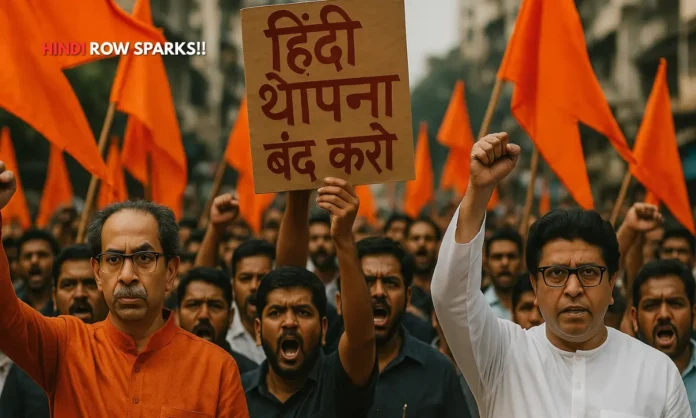SUMMARY
– Shiv Sena (UBT) and MNS to hold joint protest march on July 5 against state’s three-language policy.
– Policy seen as a cultural imposition; opposition parties cite Constitution, children’s cognitive load.
– Move unites estranged Thackeray cousins ahead of BMC elections in a rare show of regional solidarity.
A Linguistic Flashpoint in the Shadow of the BMC Polls
Maharashtra’s simmering linguistic anxieties have found a flashpoint: the state’s controversial plan to introduce Hindi as a mandatory third language in primary schools. What began as separate protests by Shiv Sena (UBT) and Maharashtra Navnirman Sena (MNS) has now morphed into a rare alliance between two estranged Thackeray cousins—Uddhav and Raj—triggering political tremors far beyond the education department’s purview. On July 5, the streets of Mumbai will witness a joint protest march from Girgaum to Azad Maidan against what both parties are now calling a “Hindi imposition.”
With the Brihanmumbai Municipal Corporation (BMC) elections around the corner, the protest may have deeper implications. For both regional parties, this rally is not just about protecting Marathi linguistic identity—it is about reclaiming political ground in a state where the BJP has been aggressively expanding its cultural and administrative footprint. At stake is not only the cultural autonomy of Maharashtra’s schools, but also the future political capital of the Thackeray scions in the post-Shiv Sena split era.
जय महाराष्ट्र!
— Sanjay Raut (@rautsanjay61) June 27, 2025
"There will be a single and united march against compulsory Hindi in Maharashtra schools. Thackeray is the brand!"
@Dev_Fadnavis
@AmitShah pic.twitter.com/tPv6q15Hwv
A Rare Thackeray Alliance With Deep Cultural Undertones
- Shiv Sena (UBT) and MNS will lead a unified morcha against the new policy on July 5.
- Uddhav and Raj Thackeray are presenting a united front for the first time in years.
- The protest is framed as resistance to “cultural encroachment” and “linguistic imposition.”
The protest marks a rare moment of unity between Uddhav Thackeray and Raj Thackeray, whose decades-long rivalry has fragmented the Shiv Sena vote base. Shiv Sena (UBT) MP Sanjay Raut confirmed the joint march in a tweet accompanied by a symbolic image of the two cousins standing before Bal Thackeray’s portrait—visibly invoking the founder’s legacy.
While Raj Thackeray had initially called for a protest on July 6, he revised the date to July 5 to avoid clashing with Ashadhi Ekadashi, a day of deep religious significance. Meanwhile, Uddhav’s camp had already backed a separate protest scheduled for July 7, led by the Tribhasha Sutra Anti-Mumbai Coordination Committee. That both parties are now converging on the same date and cause signals the start of an unspoken electoral understanding—one that could potentially reshape voter alignments in urban Maharashtra.
Questioning Constitutional Basis and Educational Burden
- Uddhav Thackeray warns against “cultural colonisation” through educational policy.
- Aaditya Thackeray and Sharad Pawar raise concerns about student cognitive overload.
- BJP’s intentions questioned, with references to JP Nadda’s controversial statements.
Uddhav Thackeray minced no words in linking the language policy to a broader ideological agenda. “We will not allow the imposition of Hindi as a third language in Marathi and English schools. This is not just an educational issue; it is cultural encroachment,” he said, framing the debate as one over autonomy and identity rather than curriculum design.
His son Aaditya Thackeray echoed similar concerns, arguing that education should not be burdened with ideological pressures. “No language should be forced. Why only Hindi? Why not improve what’s already in place rather than adding to the load?” he asked, subtly referencing the BJP’s centralising tendencies.
Even veteran political voice Sharad Pawar weighed in, cautioning that Hindi should not be made compulsory in primary education. “After Class 5, sure. But we need to assess what a child can realistically absorb,” he said, invoking both developmental psychology and constitutional ethos.
BJP’s Cultural Playbook and Regional Pushback
- BJP’s three-language formula includes Hindi, Marathi, and English for primary students.
- Policy seen as part of BJP’s broader cultural integration strategy across non-Hindi states.
- Regional identity, political strategy, and education policy converge in a volatile mix.
The current language policy is part of the BJP’s three-language formula being implemented across several states. In Maharashtra, where Marathi pride and linguistic identity are deeply entwined with politics, the inclusion of Hindi has triggered widespread resistance. Critics argue that this move is not about education, but assimilation—an attempt to align schoolchildren’s minds with the cultural goals of Hindi-Hindu-Hindustan nationalism.
For the BJP, the move may have seemed minor—a bureaucratic adjustment in the education department. But in Maharashtra, where politics is frequently driven by questions of identity and legacy, it has sparked a mobilisation that may ripple into the BMC elections.
Raj Thackeray, who has historically taken aggressive stances on linguistic and regional pride, is now riding a new wave of legitimacy, ironically alongside the very cousin he once battled to eclipse. Together, the Thackerays are reframing the narrative from party versus party to people versus imposition.
Not Just About Language Anymore
The July 5 protest may appear to be a reactionary rally against a language policy, but its subtext is far more potent. It is a moment of recalibration for regional forces struggling to maintain relevance in an increasingly centralised political landscape. It is also a cultural call to arms, echoing Bal Thackeray’s legacy while navigating the modern contours of coalition politics, education policy, and identity preservation.
Whether this Thackeray détente lasts beyond this issue is uncertain. But in Maharashtra’s combative political theatre, even symbolic unities can have lasting electoral consequences.


